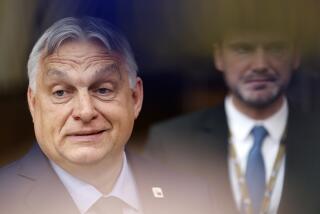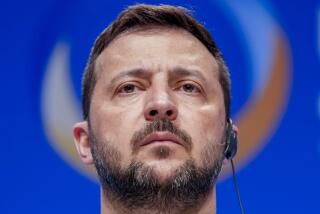Regional Outlook : Drinking a Toast to Europe’s Future : Leaders of 34 nations will meet in Paris next week. Times correspondents in key capitals report on their hopes and fears for the Continent.
- Share via
BERLIN — Few nations have benefitted from the CSCE process more than Germany. No nation is a greater supporter today, and no nation has higher hopes for its future.
Some also argue that the CSCE could have no better patron than the newly confident united Germany--a country that will exert considerable influence over the Continent’s future.
Foreign Minister Hans-Dietrich Genscher was among the first to press for a permanent secretariat and other institutions that would transform the CSCE from a series of ad-hoc conferences to something more permanent. And he, as many of his countrymen, now see the CSCE as a primary part of what many refer to as the “future architecture of Europe.”
Indeed, Genscher’s CSCE cheerleading has raised suspicions in Washington that he envisions it as a replacement for NATO--a suspicion not entirely rejected by his spokesmen. “Sometime in the future--and we are talking of a development that may last decades--the alliances could be absorbed by the new architecture,” said a German Foreign Ministry official.
The reason for the German enthusiasm for CSCE is not hard to understand.
Said Genscher in a recent radio interview, “Without the Helsinki Final Act and the CSCE process, the developments in the Soviet Union launched by Gorbachev would not have been possible, and without this, there would not have been the peaceful revolutions in middle and Eastern Europe that brought German unification.”
This assessment of past success has now been transferred by the Germans into high expectations for the future. For them, the CSCE is the only existing forum where all European nations plus the United States and Canada have a voice in building the new Europe. However important the EC and NATO may be, these bodies remain too regional to tackle European-wide problems.
For the Germans, there is only one answer: the CSCE.
“Next week is the first time since 1815 (the Congress of Vienna) that all the states of Europe have come together to shape a common future,” noted a German Foreign Ministry official. “In 1975, the challenge was living together within a status quo. Today, it is, ‘How do we shape a new European destiny based on democratic values and a free market economy.’ ”
More to Read
Sign up for Essential California
The most important California stories and recommendations in your inbox every morning.
You may occasionally receive promotional content from the Los Angeles Times.













